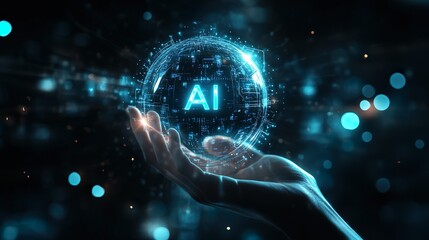The world of technology is constantly evolving, and one of the most exciting developments in recent years is artificial intelligence (AI). With AI becoming a part of everyday life, we’re seeing significant improvements in multiple sectors, from healthcare to education. In this article, we’ll explore the ways AI is shaping the future and how it will continue to influence our daily lives.
AI’s Role in Automating Daily Tasks
One of the most noticeable impacts of AI is its ability to automate routine tasks, saving time and effort for individuals and businesses alike. AI-powered virtual assistants, such as Siri, Alexa, and Google Assistant, are becoming more advanced, allowing users to manage their day with ease. These assistants can schedule appointments, control smart home devices, and answer questions with increasing accuracy, transforming the way we interact with technology.
AI in Healthcare: A New Era of Medical Advancements
AI is making waves in the healthcare sector, bringing about revolutionary changes in diagnosis, treatment, and patient care. Machine learning algorithms can analyze vast amounts of medical data to detect patterns and predict diseases earlier than human doctors. For example, AI is being used to improve imaging analysis, helping radiologists identify potential health risks like tumors. As AI continues to enhance medical practices, it holds the potential to save lives by providing quicker, more accurate diagnoses.
Enhancing User Experience in Customer Service
AI has also had a profound impact on customer service, improving both the efficiency and effectiveness of businesses in handling customer queries. Chatbots powered by AI can respond instantly to customer inquiries, providing relevant answers without the need for human intervention. This not only reduces wait times for customers but also frees up customer service representatives to focus on more complex issues. With AI’s ability to handle large volumes of requests simultaneously, businesses can deliver an improved, seamless experience to their clients.
AI and Personalized Shopping Experiences
AI is changing the way we shop, allowing for more personalized recommendations based on individual preferences. Retailers use AI algorithms to analyze consumer data, offering products that match a person’s browsing habits or past purchases. These algorithms can even predict what a customer might be interested in purchasing, leading to a more tailored shopping experience. This not only helps businesses increase sales but also ensures that customers find the products they truly want with minimal effort.
AI in Education: Transforming How We Learn
The education sector is also benefiting from AI, with technology helping to make learning more engaging and accessible. AI-powered tools are being used to create personalized learning experiences for students, adapting to their needs and providing targeted resources based on their strengths and weaknesses. Virtual tutors and automated grading systems are making education more efficient, allowing teachers to focus on what really matters—helping students succeed.
The Future of AI: Possibilities and Challenges
As AI continues to evolve, we can expect even more innovative applications in various fields. The potential for AI to reshape industries like transportation, finance, and entertainment is limitless. However, there are challenges to consider, such as ensuring the ethical use of AI and protecting privacy. It’s crucial for lawmakers, businesses, and tech developers to work together to create frameworks that address these concerns while fostering AI’s growth.
Conclusion
Artificial intelligence is no longer a futuristic concept but a part of our everyday lives. As we continue to integrate AI into more aspects of society, we can expect incredible advancements in how we live, work, and communicate. While challenges remain, the potential of AI to improve healthcare, education, customer service, and more is undeniable. By embracing these advancements, we can look forward to a world where AI makes life easier, more efficient, and more personalized.
